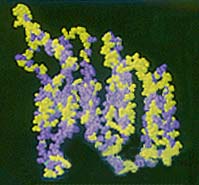LABORATORY OF AFFECTIVE NEUROPHARMACOLOGY
|
|
At left is a computer-generated model illustrating one possible configuration of the monoamine transporters- with twelve transmembrane regions arranged to form two cylindrical passages. Purple amino acids are identical in dopamine and serotonin transporters, while yellow residues differ. |
The Laboratory of Affective Neuropharmacology is studying the effects of mood active drugs on critical molecular events in the brain's emotional circuits. In this way we hope to better understand how addiction or depressive disorder changes a person's perception. Normally, the signaling from one neuron to the next is controlled by the amount of neurotransmitter released in the gap, or synapse, between neurons. The dopamine and serotonin transporters, which return released neurotransmitter to the neuron, are especially critical in controlling the intensity of signaling in important mood circuits. When taken, cocaine immediately disrupts the dopamine transporters, increasing dopamine concentrations in the synapse, which eventually leads to pleasure and euphoria. Our experiments are discovering persistent disturbances in brain dopamine and serotonin transporters in persons who were addicted to cocaine or alcohol. We have modeled these changes in neuronal cultures expressing cloned human transporters and are determining the biochemical mechanisms involved. These transporter changes likely have major ramifications for the functioning of the entire neuron. We believe these disturbances may contribute to long-term changes in a person's emotional perceptions and impulses. Serotonin transporter abnormalities may also play a role in serious mood disorders, suicide, and the therapeutic response to antidepressant treatment, new areas of expanding exploration for the Laboratory of Affective Neuropharmocology.
To learn more about our lab, please chose from the following links:
Cocaine Effects on Dopamine Neurons
Recent Papers and Abstracts
Related Links
Lab Members
Upcoming: Read Dr. Little's Recent Interview on Lifescape.
Thank you for being visitor
Questions? Comments? ![]() Dr. Karley Little
Dr. Karley Little
This site was last updated 6/14/01.
